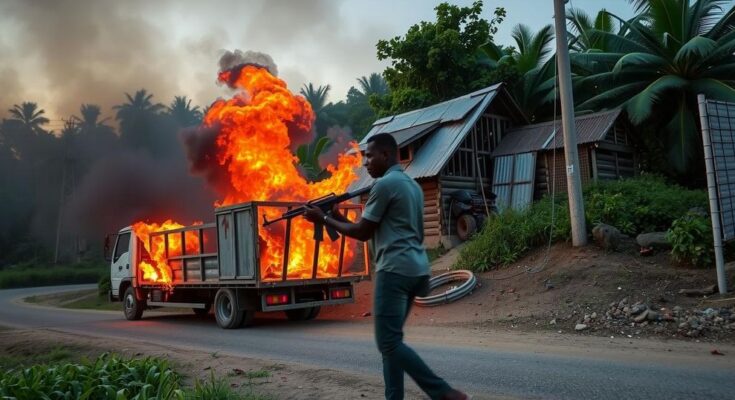Fighting intensifies between the Congolese army and M23 rebels in eastern Congo ahead of imminent peace talks. The Congolese army accused M23 of killing civilians, a charge the group denies. The conflict has led to significant displacement, and international concerns grow regarding Rwanda’s involvement. Local residents express a desperate need for peace, while analysts question the negotiations’ potential effectiveness.
GOMA, Congo (AP) — Recent days have seen a significant escalation in hostilities between the Congolese army and the M23 rebel group in eastern Congo, particularly in the Lubero territory of North-Kivu province. This surge in violence arrives just before crucial peace talks scheduled for Sunday. The Congolese army has accused the M23 rebels of perpetrating the killings of 12 civilians earlier this week, a claim that the M23 has categorically denied, referring to it as mere propaganda from the Congolese government.
The M23 is one of numerous armed factions that operate in eastern Congo, a region notorious for its rich mineral resources and protracted conflict, which has resulted in one of the largest humanitarian crises globally, displacing over seven million individuals. Accusations have been levied against Rwanda for allegedly supporting the M23 group, a claim that Rwanda has consistently refuted, despite acknowledging its troop presence in the region to protect national security.
The situation has further complicated diplomatic efforts, evidenced by an agreement in February between the foreign ministers of Congo and Rwanda regarding the withdrawal of Rwandan troops. Previous attempts to establish peace have faltered, with a ceasefire agreement signed in July failing to prevent renewed violence. The United States has expressed significant concern regarding these ceasefire violations. As President Felix Tshisekedi of Congo and President Paul Kagame of Rwanda prepare to meet in Angola amid this turbulence, the hopes for a resolution remain tenuous.
Aline Kasereka, a resident of Lubero, emphasized the urgency of negotiating peace, stating the overwhelming toll that conflict has taken on civilians. Similarly, analyst Henry Pacifique expressed skepticism regarding the anticipated summit’s effectiveness, suggesting that both countries may continue to blame each other for ongoing issues.
This volatile backdrop serves to highlight the dire need for constructive dialogue and a sustainable resolution to this persistent conflict.
The international community, particularly in the context of the significant humanitarian implications, remains watchful for developments in these negotiations.
The eastern region of Congo has been plagued by conflict for decades, driven by a complex interplay of ethnic tensions, control over vast mineral resources, and interference from neighboring countries. The M23, initially formed in 2012, is largely comprised of individuals from the Tutsi ethnic group and has long sought influence in the region, often clashing with Congolese forces. Despite various peace agreements and interventions, the region has remained unstable, with numerous armed groups vying for control and a significant humanitarian crisis ongoing. The involvement of Rwanda adds another layer of complexity, as accusations of support for militant factions have perpetuated tensions between the two nations. Recent peace talks mediated by Angola are a critical attempt to address these longstanding issues and could potentially lay the groundwork for improved stability in the region.
The escalating conflict between the Congolese army and M23 rebels signifies a troubling trend as peace talks approach. Allegations of civilian casualties and external interference underscore the challenges faced by the Congolese government in stabilizing the region. The sentiments expressed by local civilians and analysts alike reflect a profound desire for peace, overcoming the historical grievances that continue to fuel violence. As President Tshisekedi and President Kagame prepare to negotiate, the weight of the humanitarian crisis demands urgent and effective solutions.
Original Source: apnews.com




